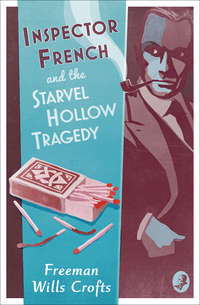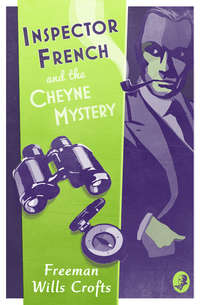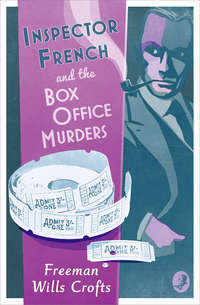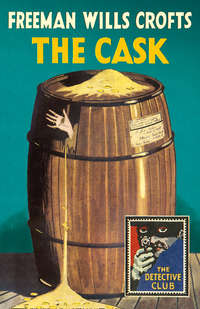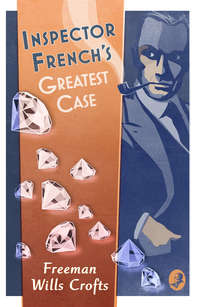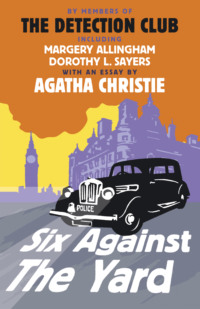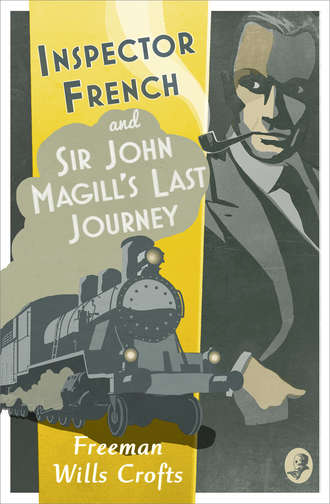
Полная версия
Inspector French: Sir John Magill’s Last Journey
‘That’s about it,’ French repeated, while M’Clung nodded appreciatively. ‘All the same, Superintendent, I shouldn’t put too much dependence on a man’s previous character in a case of this kind. I’ve seen too many cases of the most unlikely people going wrong, and I’m sure so have you.’
‘I agree and I don’t attach too much weight to it. All the same it counts. Now Inspector the only other point you learned was that someone named Coates, with a Belfast address, who was otherwise unknown to his household, had recently called on Sir John?’
French agreed.
‘Now I’ll tell you what we’ve done. We’ve gone over for the second time the whole story as M’Clung told it to you. We’ve learnt nothing to add to it but we’ve got a fairly complete corroboration as to its truth. First, with regard to Sir John himself. We find that he was practically under observation during his whole journey right from London up to the point at which he left the taxi in Sandy Row. You learn that he drove from his house to Euston and started in a sleeping berth on the 7.40 p.m. to Stranraer. We checked his arrival at Stranraer and his going on board the boat: we found the man who carried his luggage. At Larne he was seen leaving the boat and entering the train. Again at Belfast he was in sight of one or more people from the moment he left the train until he reached Sandy Row. So far as Sir John is concerned the story is absolutely confirmed.’
‘Jolly good to get all that independent evidence,’ French commented tactfully.
‘Principally a series of lucky flukes,’ Rainey corrected. ‘Now with regard to Major Malcolm Magill. Here also we’ve got practically complete confirmation as to his movements. M’Clung didn’t tell you that?’
‘Gilmore hadn’t finished, sir, when I left,’ the sergeant pointed out.
‘Neither he had,’ Rainey admitted. ‘Well, I’ll tell you now. Malcolm Magill’s statement was, if you remember, that he got a telephone from his father asking him to come to Whitehead to pick him up and that he, Sir John, would walk out along the Larne road to meet him. That call came, according to Malcolm, at a minute or two before nine. We have checked it up both at Whitehead Station, where it was made and, at the exchanges, and it was actually put through at 8.53.’
‘Good enough,’ said French.
‘Good enough, yes,’ Rainey repeated. ‘The major went at once and got the car. He estimates that he left his house, Lurigan, at about five minutes past nine, and this is confirmed both by his wife and the housemaid. Under the circumstances it was natural for Mrs Magill to look at the clock, and the housemaid states she heard the car leaving, about five minutes after the clock had struck. So that also is good enough.’
French again signified his agreement.
‘The major states that he drove at a fair speed until he was within a couple of miles of Whitehead, the extreme point to which he thought his father might have walked. Then he slowed down to ten or fifteen miles an hour, keeping a sharp lookout for foot passengers. He met no one and therefore went on into the town to make inquiries. He found that the post office was closed and he was directed to the station where there was a booth on the up platform. He saw the stationmaster, who told him about the elderly gentleman who had come off the Belfast train at 8.47 and who had made a call from the booth. That, the major states, was about 9.45, and this hour is confirmed both by the stationmaster and by an estimate of the time it ought to have taken Malcolm to come from Lurigan. So that was that.’
Superintendent Rainey glanced at French as if to invoke his commendation. French hastened to bestow it.
‘Major Magill imagined his father must have got a lift to Larne and he started home again. But he states he was unhappy about the whole affair, and when he had gone seven or eight miles it suddenly occurred to him that he might have missed the old man through the latter making a call in Whitehead. He therefore turned round and went back again. There were two families in Whitehead with whom the Magills were on fairly intimate terms and he drove first to one and then to the other. But neither knew anything of Sir John, and though they telephoned to other possible houses, no one had seen the old man. The major states that some considerable time was occupied with this telephoning, so that it was almost eleven when he left Whitehead. This again is not only confirmed by an estimate of the time these movements should have taken, but also by the exchange and the local residents. At the last house the daughter declared that she looked at the clock as the car started and that it was exactly ten-fifty-five.
‘The major states that he drove slowly back looking out again for foot passengers, and that again he saw no one. This time, however, he drove home, arriving about eleven-thirty, which once again checks in with distance and probable speed. When he had garaged the car and had a whisky and soda he rang up his friends in Whitehead to report progress, as they had asked him to do. This call has also been traced and it was put through at exactly eleven-forty-three. Incidentally the hour of his arrival home is confirmed both by Mrs Magill, who had waited up to meet Sir John, and by the servants, who slept over the garage and heard the car being put in.’
French made a gesture of astonishment.
‘I don’t think, sir,’ he declared, ‘I ever heard such complete confirmation of any story. Major Magill’s movements have been confirmed as absolutely as Sir John’s.’
M’Clung looked delighted by what he evidently took to be a compliment to the Belfast force. But Rainey shrugged.
‘More lucky flukes,’ he declared. ‘Next with regard to the secretary. Breene’s story seems also to have been true. He certainly travelled over by Liverpool on that night and went down to his brother’s at Comber. He left Comber, so his sister thinks, about half past nine, and as the only suitable train leaves at exactly 9.30, I think we may take it that he travelled by it as he says. That train arrives at 9.50 and he reached the Grand Central Hotel, ten minutes away, at 10.30. About half an hour of this time is therefore unaccounted for. He says he took a walk through the streets, and as that would have been an eminently likely thing for him to have done, I think we may accept that also. The staff at the hotel absolutely confirm his further statement. He arrived about 10.30, asked for Sir John and said he would be in the lounge if wanted. We have seen his bill and found waiters who served him at lunch, tea and dinner that day and at breakfast the next morning. We have also seen the chambermaid who called him.
‘Nothing there, sir,’ said French.
‘No,’ agreed Rainey, ‘there’s nothing there. But, French, I’m far from satisfied about Malcolm Magill. Things are very black against him.’
Of this French was by no means convinced.
‘I don’t know, sir,’ he answered. ‘Looks to me mighty like an alibi.’
‘You think so,’ said Rainey, thoughtfully lighting a cigarette. ‘I’m not so sure. Assuming Sir John has been murdered—for remember we don’t even know that yet—why could Malcolm not have done it?’
‘Well, there’s all this that you’ve been telling me. Besides that there’s the disposal of the body. I don’t see how he could have disposed of the body. Suppose he met Sir John, murdered him, staged the struggle and hid the hat. What would be do with the body? He couldn’t leave it on the road. He couldn’t take it in the car to those people in Whitehead, any of whom might have offered to accompany him on his search. Nor could he hide it, at least not without leaving some trace of beaten-down grass or something of that sort, and no trace was found.’
Rainey moved uneasily.
‘But hang it all, French, Sir John has disappeared. Malcolm Magill had the motive and the opportunity and so far as we know no one else had either. These difficulties that you raise …’ He held up his hand as French would have spoken. ‘Let’s go back to fundamentals. If he didn’t murder Sir John, where is Sir John? What’s happened to him?’
French shook his head.
‘I realise that all right, sir,’ he admitted, ‘but you’ve just pointed out yourself that the murder theory is still only an assumption. What if Sir John disappeared voluntarily?’
Rainey made a gesture of agreement.
‘That’s quite true, French. Better still, it leads us to something we do know, and that is that we’re theorising too soon. I’ve something more to tell you—two things in fact.
‘The first is a small matter. Among our other lines of inquiry we made a house-to-house visitation in Sandy Row and the adjoining streets in the hope of finding someone who expected or actually met Sir John. That, I regret to say, brought us nothing.
‘The second is that we issued a description of Sir John and circulated it to the police throughout the whole of Northern Ireland. And to this we got a reply which I confess surprised me.’
Rainey paused to emphasise his climax. French was impressed by all he had heard. If there was any more efficient way of handling a case than that these men had adopted, he felt he would like to know of it.
‘Sir John had been seen once again after he left Sandy Row,’ went on Rainey. ‘You noticed that big hill with the flat top and the precipitous front to the north of the city as you came in?’
‘I was admiring it, sir,’ French declared. ‘It reminded me of pictures I had seen of Table Mountain.’
‘I never saw Table Mountain,’ said Rainey, ‘and whether it’s like it or not I don’t know. It’s called the Cave Hill and it’s about twelve hundred feet high, with a splendid view from the top. Along its lower slopes runs the main road to Antrim, and from this Antrim Road a steep path leads to the top, the Sheeps’ Path. Now half an hour after Sir John Magill reached Sandy Row, a constable saw him get out of a tram at the foot of this path, and after looking round in a surreptitious sort of way, hurry up it. The path disappears immediately into trees, so that the constable lost sight of him at once. Of course he was some distance away, but he is positive he made no mistake about it’s being Sir John.’
‘By Jove, sir, very strange that! Have you any idea what he might have gone up there for?’
‘Well, a possible suggestion is that it was to meet someone about his invention. But there doesn’t seem to be any reason for such a theatrical kind of secrecy.’
‘That path doesn’t lead near any houses?’ French asked.
‘It leads up through the grounds of Belfast Castle. But there are many private houses along the inland side of the Antrim road and no doubt you could get to these from the path. You could go along parallel to the road on the side of the hill and drop down at the back of any of the houses. But why?’
‘Somebody in one of those houses working at the same idea?’
The superintendent glanced at Sergeant M’Clung.
‘That’s what M’Clung suggested,’ he answered, ‘and we have made a list of the occupiers of the houses for investigation. But I’m not hopeful of it myself.’
‘Have you any other theory, sir?’
Rainey shook his head.
‘I confess I haven’t. Sometimes I wonder if the old man hadn’t gone dotty, but there’s little to support that.’
‘Mightn’t he have just been out for a walk?’
‘We considered that also,’ the superintendent admitted, ‘but I think it’s unlikely. Sir John was too old and didn’t seem keen on that sort of thing. Then there was his secretive manner when he disappeared up the path. No, it’s certainly a puzzle—unless the constable made a mistake after all.’
Rainey paused and there was silence for some moments. Presently he went on.
‘Now there are one or two inquiries suggested by your statement, Inspector. M’Clung, you get away to M’Millan & Maxwell’s and ask them if they know anything of a Coates who might have called on Sir John, or who is interested in inventions or silk or linen. At the same time I’ll get a systematic search made among all of the name in the city. With any luck we should get something there.’
French agreed that both these avenues should be explored. Once again he felt impressed by the efficiency with which the case was being handled. These North of Ireland men had nothing to learn from London. He had to admit that even he himself could not have done much more in the time.
In half an hour M’Clung re-entered. A glance at his face gave his news.
‘No good, sir,’ he reported. ‘I saw M’Millan himself. They don’t know anybody called Coates that would suit.’
‘Had they been working on this silk-linen invention?’
‘Never even heard of it, sir.’
‘I thought that would be the way,’ Rainey declared, ‘so I’m hardly disappointed. Better luck next time, Sergeant.’
Before either man could reply a knock came to the door.
‘Gentleman to see you, sir,’ a constable said, handing Rainey a card.
‘“Mr Victor Magill.” Yes, this is the time I asked him to call. We’d better see him, Inspector.’
He glanced at French, and the latter having signified his agreement, he told the constable to send Mr Magill in.
4
Belfast
Victor Magill was a small man, thin and wiry, and walking with a considerable limp. His features were strongly marked, the bones standing forward. His eyes were surmounted by a heavy frontal projection, his cheekbones were high and his chin and jaw well developed. A mobile expression and a nervous, eager manner gave him an appearance of energy and force, but this was countered by a weak mouth.
‘Good morning, Mr Magill,’ Rainey greeted him. ‘I am Superintendent Rainey and this is Detective-Sergeant M’Clung of our service. You have come at an opportune moment, Mr Magill, for we have with us here Detective-Inspector French from Scotland Yard, who who has come over to consult with us about Sir John’s disappearance.’
‘This is a terrible and most mysterious affair,’ Victor said as he shook hands. ‘I came directly I heard of it. My cousin, Malcolm, has just been giving me the details. He would have come down with me, but he had a directors’ meeting. I should like to know if you have learned anything fresh?’
‘I’m sorry to say we have not,’ Rainey answered. ‘We were just checking over how we stood with Inspector French, and we certainly haven’t much to go on. When I got your phone this morning I began to hope that you were going to give us some information.’
‘I?’ Victor Magill shook his head. ‘I should be only too thankful, were I able. But I’m afraid I know nothing that could help you. In fact the thing staggers me altogether. My poor uncle was the last man to be mixed up in anything abnormal. He was so conventional and—respectable is scarcely the word—I might perhaps say that he was a pillar of ordered society. I suppose’—he hesitated—‘you have no doubt that he is dead?’
‘We don’t know,’ Rainey returned, ‘but I must admit it doesn’t look very hopeful.’
Victor shook his head. ‘I’m afraid not. If he were alive we would have heard of him before this. I can see that Malcolm has lost hope too. Very sad and puzzling beyond belief.’
‘How did you hear of it, Mr Magill?’
‘Malcolm and my cousin Caroline—Miss Magill, you know—both sent me wires. I have been on a yachting cruise, or rather a motor launch cruise up the west coast of Scotland. I left a list of places where we’d call. It was at one of these, at Oban, that the wires were waiting. That was yesterday morning. I just managed to catch the twelve o’clock train for Glasgow, which brought me in time for last night’s steamer to Belfast. This morning I went up to see Malcolm at the mill and then came straight down to you.’
‘Very glad to have the benefit of your views,’ said Rainey. ‘May I ask if you have formed any opinion yourself as to what might have happened?’
Victor made a gesture of impotence.
‘Not the faintest,’ he declared. ‘The whole thing is utterly inexplicable to me. My uncle seemed so well the last time I saw him. He was in fine spirits and even cracked jokes, not his usual way at all.’
‘When was that, Mr Magill?’
‘On Sunday; Sunday week, that is; the Sunday before he left town.’
‘Four days before he disappeared?’
Victor agreed.
‘And nothing passed at that interview which would tend to explain the disappearance?’
There was nothing—absolutely nothing. Victor would have been only too thankful if he could have made some suggestion, but he could not.
‘He was in unusually good spirits on that Sunday, you say. Do you know of any special cause for that?’
‘Well, I do. He had just pulled off an invention that he had been working at for years and he was frightfully bucked. He was like a child with a new toy.’
‘We had heard that he made a hobby of mechanical work. Do you know the nature of this invention?’
‘Oh, yes, he told me all about it. It was in the park that I met him that Sunday afternoon. I said: “Well, uncle, how’s the magnum opus?” for he had shown me his trial models and I knew he thought he was near a solution. His face broke out into smiles and he caught me by the arm in his eagerness—a thing that normally he would never have thought of doing. “Got it, my boy,” he almost shouted. “I’ve got it at last.” He tapped his breast pocket and repeated: “Got it here. I’m not telling the others, for between you and me they’ve always been a bit superior about my efforts. But you’ve always believed in me,” he said, “and I’ll tell you.”’
‘And he did?’
‘Yes, he showed me his sketch plans. His idea was an improved combination of artificial silk and linen. He said that at last he had found a way of running a very fine linen thread through a solution of the silk so that it came out out coated with silk, same as very fine electric wires are coated with a liquid insulator. He’d got this silk-covered thread all right in his workship, but he didn’t know how it would weave up and he was going to Belfast to get a special loom fitted up to try it.’
‘That’s important news, Mr Magill. We knew that it was about this invention that Sir John had come to Belfast. Do you know who he was going to meet here?’
Victor had no idea.
Rainey nodded, then leaning forward, he spoke more earnestly.
‘I hope you can tell us something more than this, Mr Magill. Do please think carefully. Was there any reason why Sir John might want to disappear? Had he no enemies? Was there no one who wanted his money? We are speaking in confidence. Tell us even your slightest suspicion, no matter how unsupported by evidence. Even if you’re wrong no harm will be done. A hint at this stage might prove invaluable.’
It was no use. Victor would have been only too glad to help, but he knew no more than Rainey.
‘I confess I’m disappointed,’ returned the superintendent, ‘but of course it can’t be helped. You can’t manufacture evidence any more than we can.’
For some minutes they continued discussing the affair. To French, Victor seemed not only shocked by what he evidently believed would prove a tragedy, but he appeared also personally distressed about his uncle’s fate. In fact he presently put his feelings into words. ‘I didn’t see a great deal of my uncle,’ he said, in answer to one of Rainey’s questions, ‘but I had a great respect and indeed admiration for him. And I think he liked me. He was always very decent to me anyway and I should be distressed on personal grounds to think of anything happening to him.’
Presently the conversation swung round to Victor’s cruise, and French, speaking for the first time, began to press for information. It was not likely to be needed, but there was no harm in knowing where Victor had been at the time of the tragedy.
‘That’s a matter, Mr Magill,’ he said, ‘in which I happen to be a good deal interested. A friend of mine has a motor launch and he wants me and a couple of other men to join him in just such a trip. It fell through this summer, but we hope to do it next spring. Would you mind dropping business for a moment and telling me something of your itinerary?’
Victor Magill looked at French with a slight surprise. His manner conveyed delicately that he had expected a more serious consideration for his family tragedy from a representative of Scotland Yard. But he replied politely enough.
‘Certainly. The trip was suggested by a friend of mine named Mallace, who is keen on that sort of thing and has done a lot of it. Mallace has business relations with Barrow and knows the town intimately. He knew of a motor launch there for hire, a fifty-foot boat with good cabin accommodation and he asked me and two other men to join him on a cruise up the west coast as far as Skye.’
‘My friend’s boat is not so large,’ French interjected.
‘Fifty foot is a convenient enough size,’ Victor went on. ‘You want to keep your boat as small as possible for ease of handling as well as economy. On the other hand she must be big enough to stand a fair sea. Among those islands it sometimes blows up so quickly that you can’t run for shelter. This boat suited us well. Normally one person could handle her and she was dry in a sea—full decked and plenty of freeboard. But she was slow. Old and rather clumsy and slow.’
‘Petrol fuel?’
‘No, she had a petrol paraffin set. She was economical in oil, but a bit smelly. That’s the worst of paraffin.’
‘It creeps, doesn’t it? Ends by getting in the beer and the butter.’
Before answering Victor gave a derogatory little cough and his manner made it clear that he intensely disapproved of the line the conversation was taking. But French did not seem to mind, continuing in his pleasantest way to extract information as to the other’s movements.
He and his friend Mallace, Victor explained, had travelled up from London to Barrow on the day express on the Wednesday, three days after he had seen Sir John in the park. They had reached Barrow about eight and had left almost at once for Portpatrick. There next day they had picked up the other two members of their quartet. One of these had been motoring in Scotland and had driven to Stranraer, garaging his car there till the end of the cruise. The other had unexpectedly been detained in London and had been unable to travel to Barrow. He had therefore travelled to Stranraer by the night train on Wednesday, going to Portpatrick on the Thursday.
‘Then,’ said French, ‘he must have travelled in the same train as Sir John.’
Victor stared at him.
‘I suppose he must,’ he agreed. ‘I hadn’t thought of that. In fact, I don’t know till this morning how my uncle had travelled. That’s certainly a coincidence. Well, Joss, that’s my friend’s name, can’t have seen him or known he was there, or he would have said something about it. Though on second thoughts, I don’t believe they knew each other.’
‘Then you really didn’t make up your party till you reached Portpatrick?’
‘No. Mallace and I weren’t in more than a few minutes when the others joined us. Mallace had business in Stranraer, so we lay in port all day and that night left for Campbeltown. From Campbeltown we went to Port Ellen in Islay, then to Jura by Oronsay and Colonsay and through the Firth of Lorne to Oban. We were to go on, and the others have gone on, through the Sound of Mull to Skye, round Skye and home by the Sound of Sleat, Staffa and Iona and down the Sound of Jura. Quite a decent round.’
‘By Jove, yes! A jolly trip,’ French declared. ‘I’m afraid we’ll not manage anything so elaborate, but it’s been very interesting to hear what you did.’
There was a pause, then Victor turned to Rainey.
‘Well, Superintendent, I thought of staying over here for a day or two. I don’t suppose you’ll want me, but if there is anything I can do you’ll find me with Major Magill. I’m going down to Larne now. I take it you’re pushing the investigation all you can.’
‘You may rely on us, Mr Magill. Directly we get news we’ll pass it on.’
‘None of that very illuminating’ said Rainey, when Magill had taken his departure. ‘If we find this thing out, we’re going to have to do it for ourselves. Now, Inspector, we’ve talked enough about it. Let’s decide on what we’re going to do and get on with it. Any proposals?’


